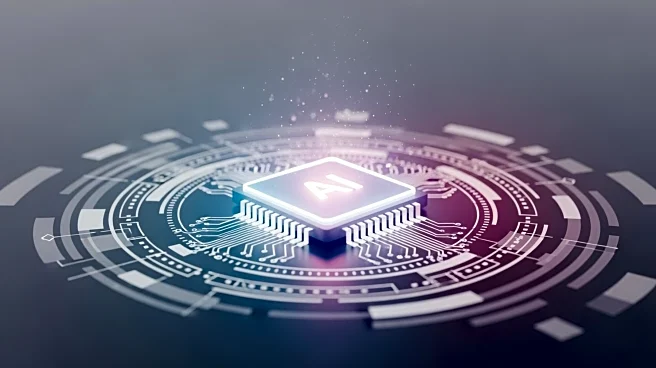What's Happening?
Nvidia CEO Jensen Huang has forecasted a future where AI agents will work alongside human employees, fundamentally transforming the workforce. In a recent interview, Huang discussed the potential for AI to
be integrated into various roles such as digital nurses, accountants, and marketers, estimating the market for AI labor to be worth trillions of dollars. He emphasized the importance of onboarding AI agents to absorb company culture, suggesting that future workforces will consist of both humans and digital humans. This shift is supported by findings from KPMG's AI Quarterly Pulse Survey, which indicates a significant increase in the deployment of AI agents across organizations. Business leaders are increasingly recognizing the value of AI agents, with many believing they will redefine performance metrics and necessitate employee upskilling.
Why It's Important?
The integration of AI into the workforce is poised to have significant implications for U.S. industries and employment. As AI agents become more prevalent, they could displace a substantial number of entry-level white-collar jobs, affecting recent college graduates and other job seekers. This transformation requires businesses to rethink how work is performed and measured, potentially leading to a shift in employment practices and performance evaluation. Companies may need to invest in upskilling their workforce to adapt to roles that AI could replace, impacting human resource strategies and employee development programs. The widespread adoption of AI agents could also drive innovation and efficiency, reshaping the competitive landscape across various sectors.
What's Next?
As AI agents continue to be integrated into the workforce, businesses will likely face challenges in managing the transition. Organizations may need to develop new HR strategies to accommodate digital employees and redefine job roles and responsibilities. The potential displacement of jobs could lead to increased demand for retraining and educational programs to prepare workers for new opportunities. Additionally, regulatory bodies may need to address ethical and legal considerations surrounding AI employment, ensuring fair labor practices and data privacy. Stakeholders, including policymakers, industry leaders, and educational institutions, will play a crucial role in navigating these changes and supporting a smooth transition.
Beyond the Headlines
The rise of AI in the workforce raises ethical and cultural questions about the future of employment and human interaction. As AI agents become more integrated, there may be concerns about the loss of human touch in certain professions and the impact on workplace dynamics. The shift towards digital employees could also influence corporate culture, requiring organizations to balance technological efficiency with human values. Long-term, this development could lead to a reevaluation of societal norms around work and productivity, prompting discussions on the role of AI in shaping the future of labor.











